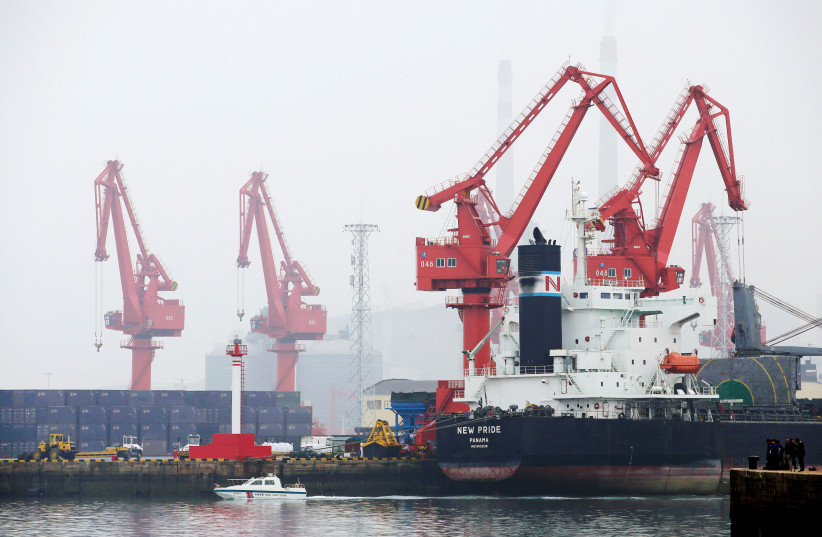WASHINGTON - The US Department of the Treasury’s Office of Foreign Assets Control (OFAC) announced on Thursday that it has sanctioned a network of Iranian petrochemical producers, “as well as front companies in the People’s Republic of China (PRC) and the United Arab Emirates (UAE) that support Triliance Petrochemical Co. Ltd. and Iran’s Petrochemical Commercial Company (PCC), entities instrumental in brokering the sale of Iranian petrochemicals abroad.”
The penalties imposed are on two companies based in Hong Kong, three in Iran, and four in the United Arab Emirates, as well as on Chinese citizen Jinfeng Gao and Indian national Mohammed Shaheed Ruknooddin Bhore.
“This network helps effectuate international transactions and evade sanctions, supporting the sale of Iranian petrochemical products to customers in the PRC and the rest of East Asia,” the State Department said.
According to Under Secretary of the Treasury for Terrorism and Financial Intelligence Brian Nelson, “the United States is pursuing the path of meaningful diplomacy to achieve a mutual return to compliance with the Joint Comprehensive Plan of Action. Absent a deal, we will continue to use our sanctions authorities to limit exports of petroleum, petroleum products, and petrochemical products from Iran.”
Under the pact, Iran limited its nuclear program to make it harder for Tehran to obtain a nuclear weapon in exchange for relief from US, European Union and United Nations sanctions that had choked Iran's oil-dependent economy.

Then-US President Donald Trump pulled out of the deal in 2018 and restored US sanctions, prompting Iran to start violating the nuclear restrictions about a year later. Talks to revive the agreement have so far failed.
Limiting exports
"Absent a deal, we will continue to use our sanctions authorities to limit exports of petroleum, petroleum products, and petrochemical products from Iran."
Brian Nelson, Under Secretary of the Treasury for Terrorism and Financial Intelligence
"Absent a deal, we will continue to use our sanctions authorities to limit exports of petroleum, petroleum products, and petrochemical products from Iran," Nelson said.
“As a result of today’s action, all property and interests in property of these targets that are in the United States or in the possession or control of US persons must be blocked and reported to OFAC,” the statement reads. “In addition, any entities that are owned, directly or indirectly, 50% or more by one or more blocked persons are also blocked.”
In Tehran, Iran's deputy foreign minister for economic diplomacy dismissed the new sanctions as ineffective.
"Our petrochemical industry and its products have long been under sanctions, but our sales have continued through various channels and shall continue to do so," Mehdi Safari told Iranian state TV.
Henry Rome, deputy head of research at the Eurasia Group, said the sanctions may aim both to raise pressure on Iran and to blunt US domestic critics who argue that US President Joe Biden has failed to rein in Iran's nuclear program.
"Washington is likely aiming to raise the costs for Iran of a continued no-deal scenario while also deflecting domestic and foreign criticism that it is allowing its Iran policy to drift," Rome said, saying that any single sanctions action was unlikely to change thinking in Iran or China absent a broader strategy.
"Indeed, Tehran may calculate that given the state of the oil market and global inflationary pressures, a concerted (US) campaign to collapse Iranian energy exports to Trump-era levels is not in the cards in the near term," Rome added.
Richard Goldberg, a senior adviser at FDD, said that the announcement is “somewhat significant in that the action targets Iran’s economy as a whole, not just siloed networks run for the benefit of the IRGC.”
“Also, the administration is taking this action using a Trump administration executive order reimposing economic sanctions on Iran, which itself presumably had been offered up as sanctions relief to Tehran,” said Goldberg.
He went on to say that “any sanctions enforcement is welcome news from an administration that has been reticent to enforce economic sanctions for fear of offending Tehran. The question, however, is whether this is a signal of a strategic shift or merely a tactical adjustment in hopes Iran will accept the very bad nuclear deal that remains on the table.”
The nuclear pact seemed near revival in March but talks unraveled partly over whether Washington might drop the Islamic Revolutionary Guard Corps, which controls armed and intelligence forces that Washington accuses of a global terrorist campaign, from the US Foreign Terrorist Organization list.
Reuters could not find contact information for Gao or Bhore to seek comment.
The Treasury Department named the Hong Kong-based companies as Keen Well International Ltd and Teamford Enterprises Ltd and the Iran-based firms as Fanavaran Petrochemical Company, Kharg Petrochemical Company Ltd and Marun Petrochemical Company.
Reuters could not obtain contact information for the Hong Kong-based firms. Kharg could not be reached for comment late on Thursday, the weekend in Iran, while Fanavaran and Marun did not immediately reply to emails seeking comment.
The Treasury listed the four UAE-based companies as Future Gate Fuel and Petrochemical Trading L.L.C., GX Shipping FZE, Sky Zone Trading FZE and Youchem General Trading FZE. Reuters could not obtain contact information for them to seek comment.
All property and interests in property of the firms falling under US jurisdiction are blocked and those who deal with them may also be sanctioned or penalized under some circumstances.
